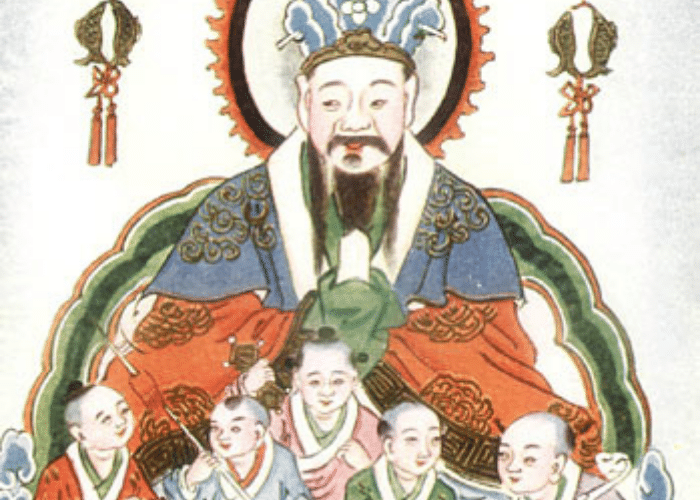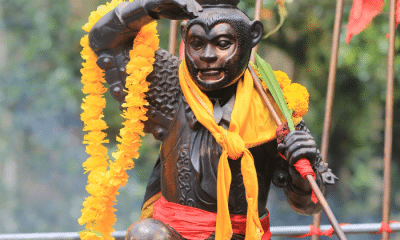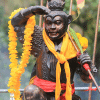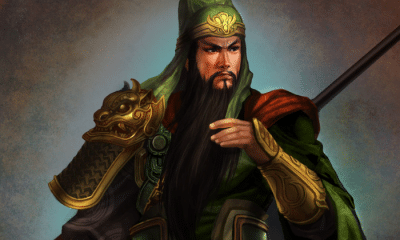
Chinese
Zao Jun: The Chinese Kitchen God
Zao Jun: The Chinese Kitchen God
In Chinese folklore Zao Jun, also known as the Kitchen God, was the household deity of the fire. So how did a male deity become associated with the kitchen?
The Kitchen God, often called by the name Zao Jun, was at the center of Chinese family life. Presiding over the stove, he inhabited the heart of the family unit.
Unlike other domestic gods, however, Zao Jun was not primarily concerned with family unity or the protection of the home. Instead, his main purpose was to tell the Jade Emperor each year what the family had done and said in private.
The household god who reported back to the authorities is a uniquely Chinese deity. He and his origins reflect not only the structure of Chinese family life, but also the bureaucracy that permeated virtually every aspect of their culture.
Zao Jun and the Home
In Chinese folk religion, Zao Jun was one of the names used for the god of the hearth.
Household deities were common in many cultures. They served as patrons of the family, protectors of the home, and emblems of domestic life.
Zao Jun also served another purpose. He reported what happened in each home to the Jade Emperor.
Each year, a few days before the New Year, Zao Jun would leave his place in the home and return to Heaven. He would tell the Jade Emperor what each family had done throughout the year and blessings and punishments would be given out accordingly.
Zao Jun was not only a spirit of protection, therefore, but also one that kept people accountable.
China was also somewhat unique in personifying the spirit of the household as a male figure. While the Kitchen God spread to neighboring Asian countries, most other cultures put a goddess in the domestic position where cooking occurred.
Two stories were given for this characterization.
The first names the Kitchen God as a mortal called Zao Jun. He was a good man but so desperately poor that he was forced to sell his own wife.
Years later, Zao Jun became a servant in the household of his wife’s new husband. This was a wealthy man and Zao Jun’s former wife lived very comfortably.
Seeing how poor and saddened her former husband was, Zao Jun’s ex-wife slipped him several homemade cakes. Into each, she had secretly baked a sum of money.
Not knowing the true value of the gift, however, Zao sold the cakes for a pittance. When he realized his mistake he was so ashamed and brokenhearted that he took his own life.
The gods took pity on him, however, and spared him the punishment that was promised to most people who committed suicide. Instead, he was given the position of the Kitchen God so he could finally remain near his beloved wife.
In another story, the god was originally named Zhang Lang. He was blessed with a faithful and devoted wife, but he carried on an affair with a much younger woman.
Zhang Lang abandoned his wife for his young mistress. In punishment, the gods struck him blind.
Unable to work or care for himself, Zhang Lang fell into poverty. His lover deserted him and he was forced to beg for food.
One day, his former wife saw him begging in the street. She invited him into her home and offered him food but because he could not see he did not recognize her.
Zhang Lang’s wife cared for him as he told her the story of how he had ended up in such a desperate situation. He wept as he told her of his betrayal and how much he had suffered afterward.
His wife listened and told him to open his eyes. His sight was restored and he could see the woman who had once again taken care of him.
Zhang Lang was so ashamed by his treatment of this wonderful woman that he threw himself into her fire. Although she tried to save his life, she was only able to pull one leg out of the fire.
In memory of Zhang Lang, his wife placed a shrine above the stove where he had died. The gods allowed him to return to the kitchen so he could be reunited with the wife he had not appreciated in life.
In both of these stories, Zao Jun is made the god of the stove not because he lived an exceptional life. Instead, his missteps and personal tragedies caused the gods to pity him and he was given a place by the hearth so he could remain close to the wife that never abandoned him.
My Modern Interpretation
The worship of Zao Jun reflects beliefs about both the family and the nation in Chinese culture.
Many ancient societies saw the hearth as the center of family life. It was where meals were prepared, warmth was shared, and often where sacrifices were burned to the gods.
The Chinese, however, tied the stove in so closely with the idea of the family that it was not unusual for a single kitchen to have multiple brick stoves.
It was not unusual in Chinese society for extended families to live within the same home. Grown children would often remain in the family home and raise their children alongside their married siblings, aunts, uncles, and grandparents.
Shared space was common, therefore, in Chinese homes. While many nuclear families could share the kitchen, however, each would have its own stove.
When a man died, his stove would be passed on to his eldest son. Younger married sons would have to install their own stoves, even if their families lived in the same household.
The stove defined the family unit. A man who used another family’s stove was guilty of neglecting the well-being of his own wife and children.
The origin stories given for the Kitchen God emphasize the stove’s role as the center of the family unit. In both, the man abandons his wife and fails to provide for her but is reunited with her once he is associated with her stove.
Many historians have pointed out that Zao Jun also illustrates the way in which Chinese bureaucracy was reflected in the religion of the people.
His presence in the home is not primarily to protect or unite the family. Instead, he is like a spy or police officer that reports to officials on their behavior.
This explains, at least in part, why a masculine deity was associated with a traditionally feminine space. Women worshipped a household goddess that served the more traditional role of protection, while men recognied Zao Jun as a representative of the type of authority that impacted their daily lives.
Like many secular bureaucrats, however, there was a belief that Zao Jun could be bribed.
Offerings were made to him not only on his birthday, but also on the day that he was said to make his report. The paper effigy that often hung above the stove was smeared with honey as well, both to sweeten Zao Jun’s lips and to seal them shut.
While the Kitchen God’s main role was not to bring the family together, he still did so on these feast days. Tradition held that the stove could only be properly prepared for the New Year if the entire family was present for the holiday.
In Summary
Zao Jun was one name for the Kitchen God, a household deity associated with stoves. He was sometimes a protector, but his primary purpose was to tell the Jade Emperor what each family had said and done over the course of the year.
At least two widespread legends explained his origins. In each, he was a man who abandoned a dutiful wife and eventually killed himself out of shame and self-pity.
In death, the gods took pity on Zao Jun and sent him to the stove so he could be close to his wife again.
His association with the stove reflects the importance of that site in Chinese homes. Even when many generations lived together, each man would be expected to provide an individual stove for his own family unit to symbolize his care of them.
Zao Jun is also indicative of the bureaucracy that flourished in Chinese culture. Like the policemen and government agents of the real world, he reported to a higher authority but could be persuaded to give a positive account of the family’s life.









